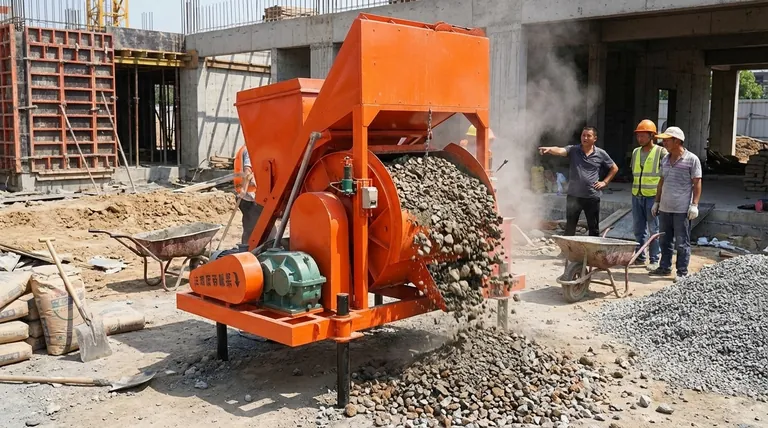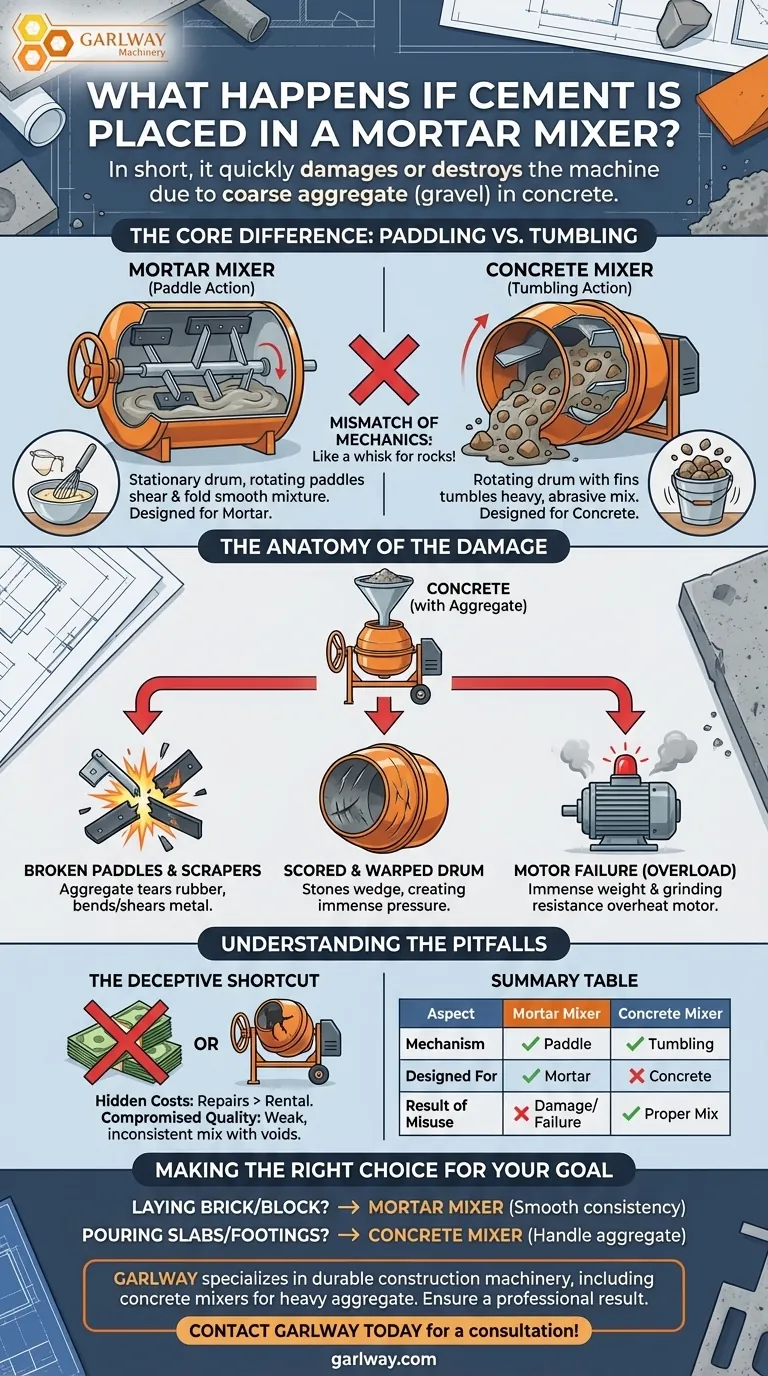In short, placing concrete in a mortar mixer will quickly damage or destroy the machine. While people often use the term "cement" interchangeably, the real damage comes from the coarse aggregate—the gravel or stones—found in concrete. A mortar mixer is a specialized tool designed for a different material, and using it for concrete will lead to costly repairs and a poor-quality mix.
The fundamental issue is a mismatch of mechanics. Mortar mixers use stationary paddles to shear and fold a smooth mixture, while concrete mixers use a rotating drum to tumble a heavy, abrasive one. Forcing a mortar mixer to handle the aggregate in concrete is like using a kitchen whisk to mix a bucket of rocks.

The Core Difference: Paddling vs. Tumbling
Understanding why a mortar mixer fails requires looking at its design intent. It's not a universal mixer; it's a specific tool for a specific job.
How a Mortar Mixer Works
A mortar mixer, often called a "paddle mixer," has a stationary drum. Inside, a central shaft with paddles rotates, folding the material.
These paddles are precisely spaced to shear through the mix of cement, sand, and water. Many models use rubber-edged paddles that scrape the drum's sides to ensure a consistent, smooth blend without unmixed pockets.
How a Concrete Mixer Works
A concrete mixer uses a completely different principle. It has a rotating, tilted drum with large fins welded to the inside.
As the drum turns, the fins lift the heavy mixture of cement, sand, and large aggregate (gravel). The material is carried upwards and then tumbles back down, relying on gravity to do the mixing. This gentle tumbling action is crucial for coating the heavy stones with cement paste.
The Anatomy of the Damage
Introducing heavy, coarse aggregate into the paddle mechanism of a mortar mixer causes a cascade of failures.
The Problem with Aggregate
Gravel and crushed stone are the defining ingredients of concrete and the primary cause of damage. These rocks are heavy, abrasive, and unpredictable in their movement.
Damage to Paddles and Scrapers
The rubber scrapers on the paddles, designed for the smooth texture of mortar, will be immediately torn or stripped away by the grinding action of the stones. Metal paddles will bend, crack, or shear off entirely under the stress.
Scoring and Warping the Drum
Stones will inevitably get wedged between the rotating paddles and the stationary drum wall. This creates immense pressure, scoring deep gouges into the drum and potentially warping its shape, rendering it useless.
Overloading the Motor
The motor and gearbox of a mortar mixer are engineered for the resistance of a paste-like mortar. The immense weight and grinding resistance of a concrete batch will quickly overload the motor, leading to overheating and permanent failure.
Understanding the Pitfalls
It's tempting to try and make one machine do two jobs, but the risks and hidden costs far outweigh any perceived benefit.
The Allure of a Single Machine
The desire to use a mortar mixer for concrete often stems from a desire to save money or space. For a small project, it can seem like a convenient shortcut.
The Hidden Costs of Failure
This shortcut is deceptive. The cost of replacing a burned-out motor, broken paddles, and a damaged drum on a mortar mixer is significantly higher than the small cost of renting the correct concrete mixer for a day.
The Compromised Mix Quality
Even if the mixer survives, the final product will be substandard. The shearing action of a paddle mixer is ineffective for concrete; it cannot properly coat the aggregate with cement paste. This results in a weak, inconsistent mix with voids, leading to structural failure down the line.
Making the Right Choice for Your Goal
Selecting the correct tool isn't just about protecting your equipment; it's about guaranteeing the quality and safety of your work.
- If your primary focus is laying brick, block, or stone: A mortar mixer is the correct tool, designed to produce the smooth, sticky consistency you need.
- If your primary focus is pouring slabs, footings, or setting posts: You must use a drum-style concrete mixer to properly handle the aggregate and ensure maximum strength.
- If you only have a single, small concrete job: Renting the correct concrete mixer for a few hours is the most reliable and cost-effective solution.
Matching the mixer to the material is the first and most critical step toward a durable and professional construction project.
Summary Table:
| Aspect | Mortar Mixer | Concrete Mixer |
|---|---|---|
| Mechanism | Stationary drum, rotating paddles | Rotating drum with internal fins |
| Designed For | Cement, sand, water (mortar) | Cement, sand, gravel, water (concrete) |
| Result of Misuse | Damaged paddles, scored drum, motor failure | Properly mixed, strong, durable concrete |
Don't risk your project or your equipment. Ensure a professional result with the right machinery.
GARLWAY specializes in durable construction machinery, including concrete mixers and batching plants designed to handle heavy aggregate for contractors and construction companies globally. Our equipment guarantees a consistent, high-strength mix for any project.
Contact GARLWAY today for a consultation and get the reliable mixer you need!
Visual Guide

Related Products
- JDC350 Small Cement Concrete Mortar Mixer
- Auto Concrete Cement Mixer Machine New
- Commercial Construction Mixer Machine for Soil Cement Mixing Concrete
- HZS90 Large Multiquip Concrete Mixers for Construction
- Construction Products Concrete Plant Machine Mixing Concrete Mixer
People Also Ask
- Why is consistent concrete mixture important in construction? Ensure Structural Integrity & Durability
- What are hydraulic cement mixers best used for? Powering Large-Scale Construction Projects
- In what types of urbanization projects are concrete mixers commonly used? From Dams to Driveways
- What are the cost benefits of a volumetric mixer? Slash Concrete Waste by 20-40%
- How do top-loading concrete mixers differ from other types? Choose the Right Mixer for Your Project
- How do self-loading concrete mixers contribute to cost savings? Streamline Your On-Site Concrete Production
- How much concrete can a batch mixer produce per cycle? A Guide to Volumes and Mixer Types
- How do self-loading concrete mixers contribute to sustainability in construction?



















